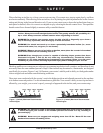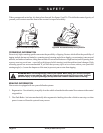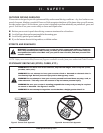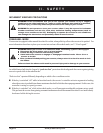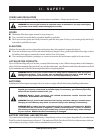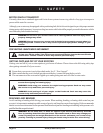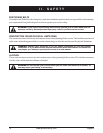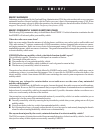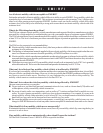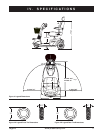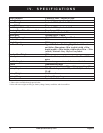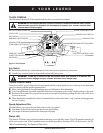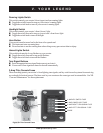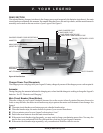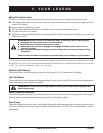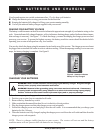
16
www.pridemobility.com Legend
III. EMI/RFI
Are all electric mobility vehicles susceptible to EMI/RFI?
Each make and model of electric mobility vehicle differs in its ability to resist EMI/RFI. Every mobility vehicle has
a particular level of resistance to EMI/RFI. This resistance is measured in volts per meter (V/m). A higher resis-
tance level offers greater protection against EMI/RFI. In other words, an electric mobility vehicle with a high
resistance level is less likely to be affected by a strong radio source than is an electric mobility vehicle with a low
resistance level.
What is the FDA doing about the problem?
The FDA has written to electric mobility vehicle manufacturers and requested that those manufacturers test their
new mobility vehicle models to be certain that they provide a reasonable degree of resistance against EMI/RFI.
The FDA has stated that all newly manufactured electric mobility vehicle models should have a resistance level of
at least 20 V/m. This level of resistance provides a reasonable degree of protection against the common sources of
EMI/RFI.
The FDA has also requested or recommended that:
n Electric mobility vehicle manufacturers clearly label new products with their resistance level or state that the
resistance level is not known.
n The labeling or informational material supplied with new electric mobility vehicles must explain what the resis-
tance level means and warn users about the possibility of EMI/RFI and how to avoid it.
n Electric mobility vehicle manufacturers undertake an educational program to inform electric mobility vehicle
users and their caregivers about the problems associated with EMI/RFI and about the actions they can take to
minimize the risk of EMI/RFI.
n While there is no exact way to tell if your mobility vehicle is totally safe, an immunity level of 20 V/m is generally
achievable and useful. This scooter has been tested and passed at an immunity level of 20 V/m.
What can I do to find out if my mobility vehicle is likely to be affected by EMI/RFI?
If you have had your mobility vehicle for some time and have not experienced any unintended motion, it is not likely
that you will have a problem in the future. However, it is always possible that EMI/RFI problems could arise if you
are close to a source of radio waves. Therefore, it is very important for you to be alert to this possibility. The
mobility vehicle meets or exceeds a resistance level of at least 20 V/m.
What can I do to reduce the risk of my mobility vehicle being affected by EMI/RFI?
Here are some precautions you can take:
n Do not turn on or use hand-held personal communications devices, such as citizens band (CB) radios and
cellular phones, while your mobility vehicle is turned on.
n Be aware of nearby radio wave transmitters, such as radio or TV stations and hand-held or mobile two-way
radios. Try not to operate your mobility vehicle too close to those transmitters. For example, if you are on an
electric mobility vehicle with a resistance level of at least 20 V/m, you should remain at least three feet from a
hand-held two-way radio and at least ten feet from a mobile two-way radio.
n Be aware that adding accessories and/or components, or modifying your mobility vehicle in any way, may
change its EMI/RFI resistance level and may make it more susceptible to interference from radio wave sources.
What should I do if my mobility vehicle moves unexpectedly?
If unintended motion or unintended brake release occurs, turn off your mobility vehicle (by removing the key) as
soon as it is safe to do so.
If my mobility vehicle moves unintentionally, where should I report the incident?
Call the Pride Customer Care at 1-800-424-8205 to report the incident.



